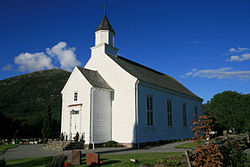Vats (municipality)
Vats Municipality
Vats herred | |
|---|---|
 View of the local church | |
 Rogaland within Norway | |
 Vats within Rogaland | |
| Coordinates: 59°29′30″N 05°44′01″E / 59.49167°N 5.73361°E | |
| Country | Norway |
| County | Rogaland |
| District | Ryfylke |
| Established | 1 Jan 1891 |
| • Preceded by | Skjold Municipality |
| Disestablished | 1 Jan 1965 |
| • Succeeded by | Vindafjord Municipality |
| Administrative centre | Vats |
| Area (upon dissolution) | |
• Total | 124 km2 (48 sq mi) |
| Population (1965) | |
• Total | 1,144 |
| • Density | 9.2/km2 (24/sq mi) |
| Demonym | Vatsbu[1] |
| Time zone | UTC+01:00 (CET) |
| • Summer (DST) | UTC+02:00 (CEST) |
| ISO 3166 code | NO-1155[2] |
Vats is a former municipality in Rogaland county, Norway. Located in the traditional district of Haugaland, the municipality existed from 1891 until 1965. The 124-square-kilometre (48 sq mi) municipality encompassed the land to the east and west surrounding the Vatsfjorden and the lake Vatsvatnet. Vats is typically divided into two parts Øvre Vats (around the lake in the north) and Nedre Vats (around the fjord in the south).[3]
History
[edit]The municipality of Vats was established on 1 January 1891 when it was split off from the municipality of Skjold. Initially, Vats had 1,095 residents. On 1 January 1965, the municipality was dissolved due to recommendations of the Schei Committee. The majority of Vats (population: 1,128) was merged with parts of Imsland, Skjold, and Vikedal, as well as all of Sandeid to form the new municipality of Vindafjord. On the same day, the Breidal and Stølsvik farms on the south side of the Yrkefjorden (population: 16) became a part of Tysvær municipality.[4]
Name
[edit]The municipality (originally the parish) is named after the old Vatne farm (Old Norse: Vatn) since the first Vats Church was built there. The name comes from the dative case of the word vatn which means "water", likely referring to the lake know known as Vatsvatnet.[5]
Government
[edit]While it existed, this municipality was responsible for primary education (through 10th grade), outpatient health services, senior citizen services, unemployment, social services, zoning, economic development, and municipal roads. During its existence, this municipality was governed by a municipal council of directly elected representatives. The mayor was indirectly elected by a vote of the municipal council.[6]
Municipal council
[edit]The municipal council (Herredsstyre) of Vats was made up of 15 representatives that were elected to four year terms. The party breakdown of the final municipal council was as follows:
| Party name (in Norwegian) | Number of representatives | |
|---|---|---|
| Conservative Party (Høyre) | 4 | |
| Local List(s) (Lokale lister) | 11 | |
| Total number of members: | 15 | |
| Party name (in Norwegian) | Number of representatives | |
|---|---|---|
| Conservative Party (Høyre) | 1 | |
| Local List(s) (Lokale lister) | 14 | |
| Total number of members: | 15 | |
| Party name (in Norwegian) | Number of representatives | |
|---|---|---|
| Local List(s) (Lokale lister) | 15 | |
| Total number of members: | 15 | |
| Party name (in Norwegian) | Number of representatives | |
|---|---|---|
| Local List(s) (Lokale lister) | 12 | |
| Total number of members: | 12 | |
| Party name (in Norwegian) | Number of representatives | |
|---|---|---|
| Local List(s) (Lokale lister) | 12 | |
| Total number of members: | 12 | |
| Party name (in Norwegian) | Number of representatives | |
|---|---|---|
| List of workers, fishermen, and small farmholders (Arbeidere, fiskere, småbrukere liste) | 2 | |
| Joint List(s) of Non-Socialist Parties (Borgerlige Felleslister) | 4 | |
| Local List(s) (Lokale lister) | 6 | |
| Total number of members: | 12 | |
| Party name (in Norwegian) | Number of representatives | |
|---|---|---|
| Labour Party (Arbeiderpartiet) | 2 | |
| Joint List(s) of Non-Socialist Parties (Borgerlige Felleslister) | 6 | |
| Local List(s) (Lokale lister) | 4 | |
| Total number of members: | 12 | |
| Note: Due to the German occupation of Norway during World War II, no elections were held for new municipal councils until after the war ended in 1945. | ||
See also
[edit]References
[edit]- ^ "Navn på steder og personer: Innbyggjarnamn" (in Norwegian). Språkrådet.
- ^ Bolstad, Erik; Thorsnæs, Geir, eds. (26 January 2023). "Kommunenummer". Store norske leksikon (in Norwegian). Kunnskapsforlaget.
- ^ Store norske leksikon. "Vats – tidligere kommune" (in Norwegian). Retrieved 30 June 2015.
- ^ Jukvam, Dag (1999). Historisk oversikt over endringer i kommune- og fylkesinndelingen (PDF) (in Norwegian). Statistisk sentralbyrå. ISBN 9788253746845.
- ^ Rygh, Oluf (1915). Norske gaardnavne: Stavanger amt (in Norwegian) (10 ed.). Kristiania, Norge: W. C. Fabritius & sønners bogtrikkeri. p. 449.
- ^ Hansen, Tore; Vabo, Signy Irene, eds. (20 September 2022). "kommunestyre". Store norske leksikon (in Norwegian). Kunnskapsforlaget. Retrieved 1 January 2023.
- ^ "Kommunevalgene 1963" (PDF) (in Norwegian). Oslo: Statistisk sentralbyrå. 1964. Retrieved 31 July 2020.
- ^ "Kommunevalgene og Ordførervalgene 1959" (PDF) (in Norwegian). Oslo: Statistisk sentralbyrå. 1960. Retrieved 31 July 2020.
- ^ "Kommunevalgene og Ordførervalgene 1955" (PDF) (in Norwegian). Oslo: Statistisk sentralbyrå. 1957. Retrieved 31 July 2020.
- ^ "Kommunevalgene og Ordførervalgene 1951" (PDF) (in Norwegian). Oslo: Statistisk sentralbyrå. 1952. Retrieved 31 July 2020.
- ^ "Kommunevalgene og Ordførervalgene 1947" (PDF) (in Norwegian). Oslo: Statistisk sentralbyrå. 1948. Retrieved 31 July 2020.
- ^ "Kommunevalgene og Ordførervalgene 1945" (PDF) (in Norwegian). Oslo: Statistisk sentralbyrå. 1947. Retrieved 31 July 2020.
- ^ "Kommunevalgene og Ordførervalgene 1937" (PDF) (in Norwegian). Oslo: Statistisk sentralbyrå. 1938. Retrieved 31 July 2020.

